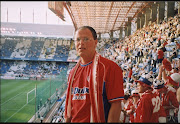 Gerry Bolan
Gerry BolanSo little is known about Gerry ‘Rollin’ Bolan’s early life, that it is widely believed among Shelbourne fans that he has born at 55 years of age, emerging into the world fully clad in blue overalls and clutching a pair of gardening shears.
He was apprentice groundsman at Shelbourne Park since 1911, serving under the great Bert O’Custard for nearly thirty years before taking over in 1939 when the latter became the only victim of the Dublin earthquake that year, being stabbed through the ear by a pair of shears in his potting shed.
As an understudy, Gerry was a model student, though Bert was definitely old school, having cold classrooms and a playground that wasn’t big enough. Because Bert mistrusted modern technology, Gerry would have to start work at 6am, coiffuring the grass with a plastic comb and trimming scissors until all the blades were of uniform height and bolt upright. For this, Bert, who stayed in bed until 11am most mornings, won many awards and the state of the Shelbourne Park pitch was the envy of thousands.
After Bert’s death, the board of directors quickly promoted Gerry to head groundsman, even promising to stump up for a new pair of trimming scissors. Gerry was having none of it. Unbeknownst to the board, he had been taking evening classes on football pitch maintenance and the ideas in his thesis were to become a groundsman’s manual for nearly seventy years.
Gerry was the first to investigate different types of grass. To the consternation of his fellow gardeners busily growing broccoli and carrots, Gerry turned his allotment into a mini-Shelbourne Park and sowed it with elephant grass (too noisy and too grey,) Kentucky blue grass (too blue,) rye grass (too cynical) and lemon grass (too yellow) before finally deciding on the green, green grass of home.
He was also the first to embrace modern technology, which caused quite a few suspicious glances from anybody who caught him at it. So, his fingers arthritic from the trimming scissors, when he took over, he demanded a lawnmower and a roller and a hose pipe with a sprinkler system.
The board was aghast. With crowds of nearly half a million at every home game and players’ wages amounting to a whopping £2 10s, Gerry’s demands would eat into the profits. And to a man they refused, which led to the great groundsman’s strike of 1940.
At first, the board tried to bluff it out but all during February, the pitch in Ringsend slowly deteriorated until it resembled the Somme circa 1917. Other groundsmen around the country tied their clipping fingers together in sympathy and came out too. The Cork Improbables team refused to play on their pitch until its condition improved and fixtures were cancelled. Hitler heard about the dispute and informed Goering to drop a load of lawn mowers on FAI headquarters as the strike was ruining his pools coupons.
Eventually the board caved in and reluctantly acceded to Gerry’s demands. A rusty lawnmower was acquired at a car boot sale and a car boot was acquired at a rusty lawnmower sale. They even bought in a roller, though it was only eighteen inches high and weighed less than a bag of sugar.
The result was seen as a victory for groundsmen everywhere. With new-fangled technology, they no longer needed to work eighteen hours a day, with time off for the match (sometimes) but could join the rest of society in working a normal 84 hour week.
All through the forties, Gerry continued to pioneer groundsman techniques. He substituted plain water for water with a dash of blackcurrant and the results were revolutionary. He doused the roller in vinegar before he rolled the pitch. And he was the first to patent the machine that has come to be known throughout the known world (and sometimes farther) as ‘the little wheely thing that marks the pitch.’
Throughout the fifties, Gerry continued to tend, roll, water and mark the Shelbourne Park pitch, which was a little pointless as Shelbourne moved out of there in 1949. Still, he refused to be parted from his beloved ground and even when they put a padlock on the gate, he would nip over the back wall at 10 o’clock at night to do a spot of nocturnal rolling.
When he died in April 1960, the board of Shelbourne FC acceded to his last wishes, rolling him out to the size of a large Chinese rug and burying him under his beloved pitch, where even today, hungry greyhounds are still digging up parts of his anatomy.




No comments:
Post a Comment